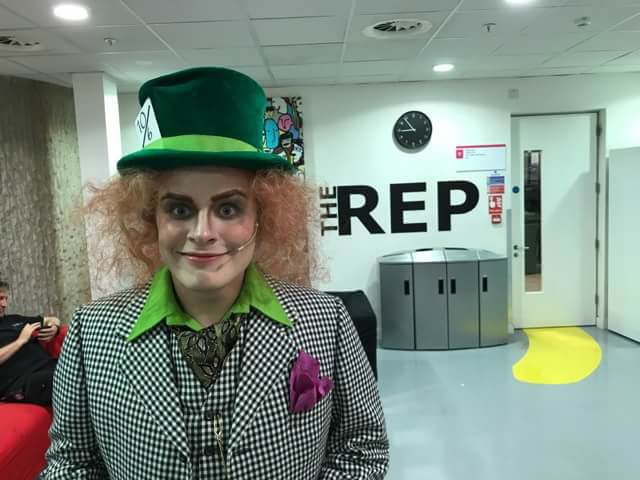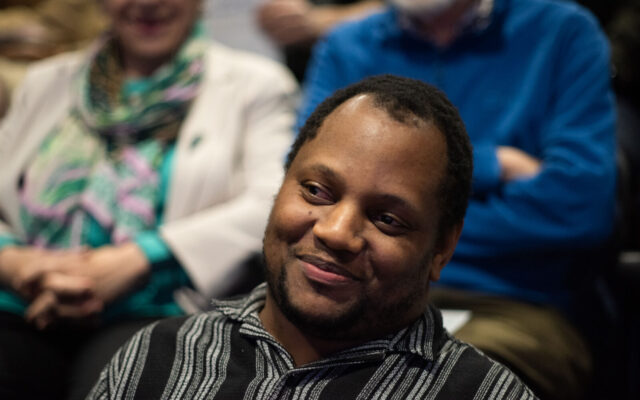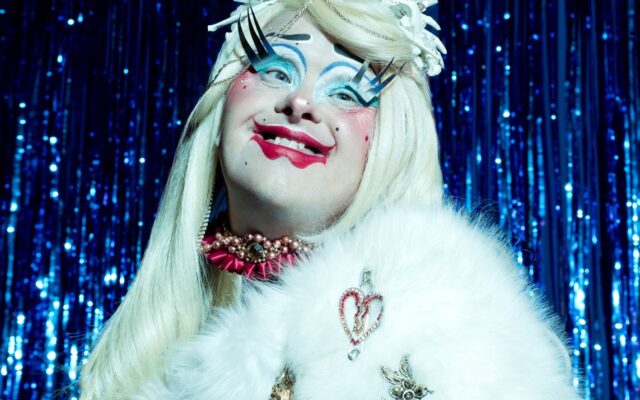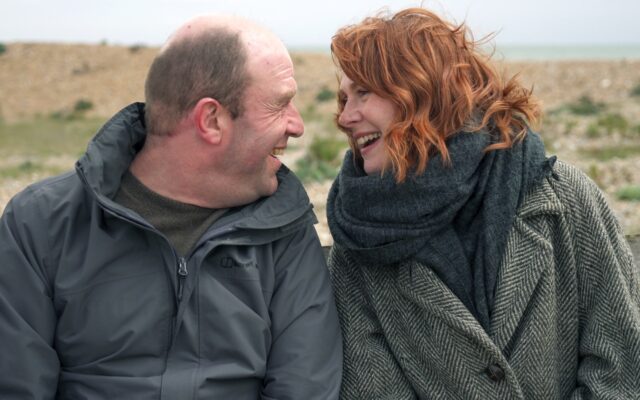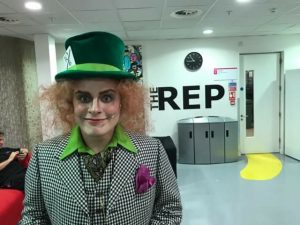 (Nicky Priest as the Mad Hatter)
(Nicky Priest as the Mad Hatter)
Mainstream theatre and TV have improved how they include people with different ethnic backgrounds and physical abilities. Richard Hayhow examines how well they are portraying – and changing perceptions of – people with learning disabilities.
Significant progress in the visibility of people with learning disabilities on TV and in theatre productions has been made across the country in recent years.
From the ground-breaking work in No Offence two years ago on Channel 4 to regular appearances in some of our favourite soaps and, indeed, in recent episodes of Silent Witness (see TV review, page 29), people with learning disabilities have had roles that have helped to break down preconceived notions of who they are and what they are capable of doing.
There are many ways to view this progress and versions of success and failure that could be drawn on to help tease out the answer to the questions of where we are as a society in our overall perception of who people with learning disabilities are, the role they can play and what contribution they can make in cultural provision.
Several significant markers reveal some current perceptions for me.
First, we have over the past five years seen a massive growth in “relaxed” performances in theatres and other venues nationwide. This has followed on the back of, for example, signed and audio-described performances and reflects a genuine desire to make performances accessible to people on the autistic spectrum and with learning disabilities.
However, this is only the first step. Unlike signed and audio-described performances, which are designed to enable sensory-impaired people to sit alongside non-disabled audience members, relaxed performances are for members of one section of society sitting alongside each other.
While being a great experience for everyone involved, including often the cast, the audience is essentially not integrated – others are not invited or do not want to take part.
Many of the rules of theatre-going are broken by a relaxed audience – standing up in the middle of show, making loud noises, wandering in and out – and other theatre-goers with differing expectations would find it difficult to be part of an audience of this kind.
Second, Open Theatre Company is working with a prominent theatre on a production of a family show featuring five professional performers with a learning disability, to be staged as part of a season of work showcased at that venue.
Without doubt, this is a truly collaborative and creative partnership project, with shared values about what we all want to achieve for the performers, and the changes needed to promote more inclusive theatre practice in mainstream settings.
However, the venue’s website says very clearly under its “Important stuff” section that the partners are working together “to support emerging performers with learning disabilities, some of whom appear in this production”. While this may seem an innocuous statement of fact, it can also be read as a warning about what people will encounter if they come and see the show.
Third, over the past three years, Ramps on the Moon, a collaborative initiative involving six theatres, has made significant strides in positioning the work of disabled artistes within mainstream theatre.
Ramps on the Moon aims “to achieve a step change in employment and artistic opportunities for disabled performers and creative teams, and a cultural change in the participating organisations to enable accessibility to become a central part of their thinking and aesthetics”.
While this programme has supported the inclusion of many performers with physical disabilities in mainstream productions, it has had little success with the inclusion of artistes with learning disabilities.
At the heart of this problem is the need to enable the different and often unique creativity of people with learning disabilities to steer the connection between accessibility and aesthetics more effectively; this is needed to radically challenge preconceived notions of the way we make theatre and the kind of theatre we make.
Ramps on the Moon in many ways seeks to include disabled performers within an existing canon of work and within conventions of performance (large stages/scripted plays) which may, ultimately, be inaccessible for many performers with learning disabilities.
Finally, we have seen a growth in the representation of people with learning disabilities on TV – but a closer analysis shows this is mainly people with Down’s syndrome. From No Offence (about a serial killer who targets young women with Down’s syndrome), to Call The Midwife and within our soaps, the prominence of Down’s syndrome is undeniable.
Why is this? Down’s syndrome is easy to recognise and to categorise. In many ways, it is the presentable face of learning disability, and other people with other kinds of conditions are excluded.
Seeing themselves
How does this context affect the performers with learning disabilities we work with? How do they see themselves in the work they do and how do they think others see them?
Nicky Priest, a stand-up comedian and actor, who recently performed in Seven Acts of Mercy at the Royal Shakespeare Theatre, says:
“I want to be a famous TV actor more than anything and it’s really important for me to be able to earn a living doing this kind of work. Performing has been something that has become a big part of my life, and has been something that has helped me through my life.
“As I have Asperger’s syndrome, drama was something that had always helped me come out of my shell and be more sociable with people. I’m convinced that people see me in a much more positive way because of seeing me as an actor.”
Vicki Taylor, a Birmingham-based spoken word artist, performer and activist, is less concerned about being famous but says:
“I want to be an actor because I love performing and I like exploring new concepts and new characters and it helps me to process life events and situations that I may otherwise struggle with.
“I also want to be an actor so that people can see me in a different way – as someone who is capable of acting and inspiring to audience members. If people knew me as a reputable actor who is well known, then I think they would think more positively about who I am and my abilities and potential.
“I think most people see me for my disabilities and what I struggle with, rather than what I can do.”
Rishard Beckett, who appeared in No Offence, has continued to pursue his acting career in a variety of ways. He has teamed up with another professional performer (without learning disabilities); they are in the middle of creating their second semi- improvised performance piece together.
Beckett is not just part of the professional team of actors involved in Open Theatre Company’s current production – he is also the visible, recognisable face of Coventry’s recent successful bid to become City of Culture 2021.
Yet he says – and has been saying since the age of 12 – that his ultimate goal is to appear in EastEnders, to the extent of knowing which family in that soap he wants to be part of.
He acknowledges the growth in his confidence in recent years resulted from his acting work. When asked what he does, he unflinchingly says: “I am an actor.” He understands now that other actors can learn from the way he acts and that all the varied work he is doing is part of his journey to reach his goal.
Common threads in success
Where does this leave us? Many individual responses fly in the face of my more cynical and critical analysis of the state of play. The common threads that run through the success stories of these three people are:
A willingness to diversify their practice to include a variety of ways of engaging in and creating performance work. The ultimate goal may be fame and TV appearances, but diversification brings changes to perceptions, and growth in skill, ability and confidence.
Support provided by a variety of agencies and individuals to nurture the development of performers in ways that are appropriate to their skills and abilities – including Open Theatre Company’s work as a creative enabler.
The willingness to explore new ways of theatre-making that begin to revolutionise our understanding of performance work.
The ultimate goal of being famous or appearing on TV is achievable by a minority of the many young people I work with. This does not mean, however, that all the others are not skilled, creative or able to contribute to the cultural life of our country – but we have to discover, support and nurture new ways of doing this.
This shift in thinking is the same shift that is needed to accept the differences at the heart of learning disabilities so it would feel comfortable to sit next to someone who is bouncing up and down on their chair and shouting loudly at the next performance we visit. Or where the fact that a show has performers with learning disabilities in it is a marketing tool to bring in audiences with high expectations of the quality of work they will enjoy, rather than a warning that may put them off coming.
Open Theatre Company:Facebook https://facebook.com/opentheatrecomp/
t @Open_Theatre_Co
Richard Hayhow is director of Midlands-based Open Theatre Company, which supports the professional careers of young people with learning disabilities to make them employable in the industry


